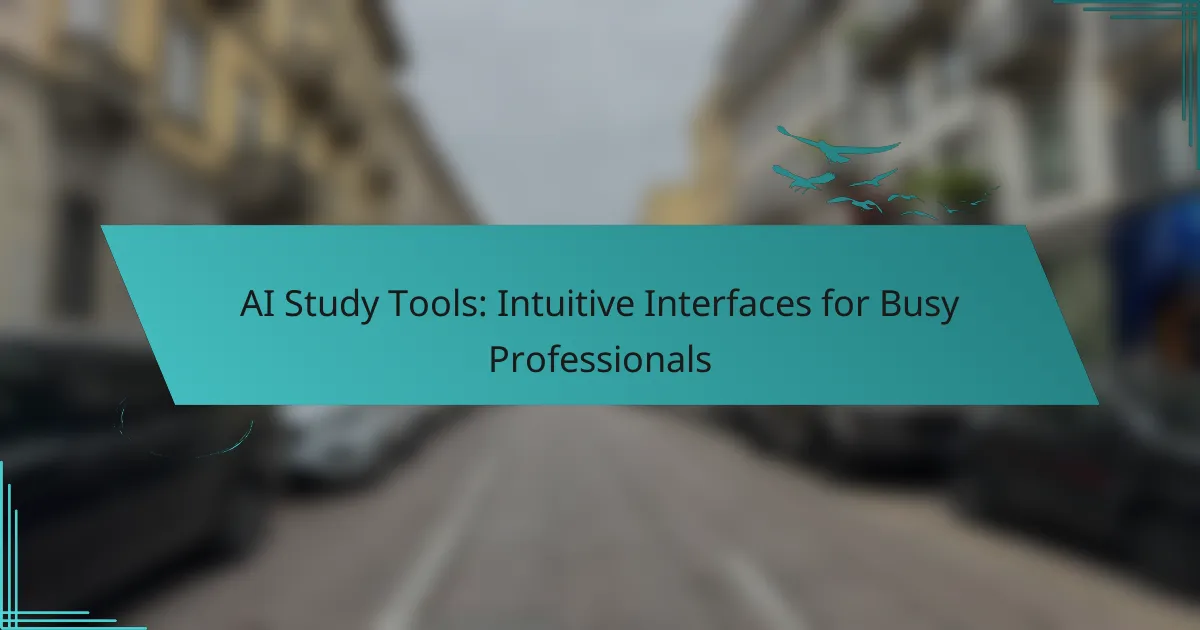AI study tools designed for busy professionals offer intuitive interfaces that simplify the learning process, enabling effective time and resource management. By automating repetitive tasks and enhancing productivity, these tools make study sessions more efficient, allowing users to focus on retention and organization. When choosing the right tool, it’s essential to prioritize usability and seamless integration with existing systems to maximize learning outcomes.

What Are the Best AI Study Tools for Busy Professionals?
The best AI study tools for busy professionals streamline the learning process, making it easier to manage time and resources effectively. These tools leverage artificial intelligence to enhance productivity, organization, and retention of information.
Notion AI
Notion AI integrates seamlessly with the Notion workspace, allowing users to create notes, manage tasks, and collaborate on projects. It offers features like automatic summarization and content generation, which can save time when reviewing materials or drafting documents.
To maximize its potential, professionals should explore templates tailored for specific tasks, such as project management or study schedules. This can help in organizing information efficiently and ensuring that important deadlines are met.
Evernote
Evernote is a versatile note-taking app that uses AI to enhance search capabilities and organize notes effectively. Its features include web clipping, document scanning, and tagging, making it easy to retrieve information quickly.
For busy professionals, setting up a consistent tagging system can significantly improve the retrieval of notes. Regularly reviewing and updating notes can also ensure that the information remains relevant and useful.
Microsoft OneNote
Microsoft OneNote allows users to create digital notebooks that can include text, images, and audio recordings. Its AI features help in organizing content and making it searchable, which is beneficial for quick access to study materials.
Utilizing sections and pages effectively can enhance organization. Professionals should consider integrating OneNote with other Microsoft Office tools to streamline workflows and improve productivity.
Google Keep
Google Keep is a straightforward note-taking tool that uses AI to help users categorize and prioritize their notes. Its integration with Google Workspace allows for easy sharing and collaboration, making it ideal for team projects.
To get the most out of Google Keep, professionals should use color coding and labels to differentiate between tasks and ideas. Setting reminders can also help in staying on top of important deadlines.
Todoist
Todoist is a task management tool that leverages AI to prioritize tasks and suggest deadlines based on user behavior. It offers features like project organization and recurring tasks, which can help busy professionals stay focused.
Creating projects for different areas of work and using labels for context can enhance task management. Regularly reviewing completed tasks can provide insights into productivity patterns and help in planning future activities.

How Do AI Study Tools Improve Productivity?
AI study tools enhance productivity by automating repetitive tasks, allowing busy professionals to focus on learning and retention. These tools streamline processes such as note-taking, task management, and personalized learning, making study sessions more efficient.
Automated Note-Taking
Automated note-taking tools utilize AI to capture key points from lectures, meetings, or readings without manual input. This feature saves time and reduces the cognitive load on professionals, enabling them to engage more actively with the material.
Many of these tools can summarize content, highlight important information, and even organize notes by topic. For instance, a busy executive can quickly retrieve notes from a recent conference instead of sifting through pages of handwritten or typed notes.
Task Management Features
AI study tools often include task management features that help users prioritize and track their learning objectives. These features can automatically schedule study sessions, set reminders, and break down larger tasks into manageable steps.
For example, a professional preparing for a certification exam can receive alerts for upcoming deadlines and suggestions for study materials based on their progress. This structured approach helps maintain focus and ensures that important tasks are not overlooked.
Personalized Learning Paths
Personalized learning paths are tailored to individual needs, adapting content and pacing based on user performance and preferences. AI analyzes how users interact with materials, allowing it to recommend resources that align with their learning styles.
For instance, if a user struggles with a specific topic, the tool may suggest additional readings or practice quizzes to reinforce understanding. This customization enhances engagement and retention, making study sessions more effective for busy professionals.

What Features Should You Look for in AI Study Tools?
When selecting AI study tools, prioritize features that enhance usability and efficiency for busy professionals. Look for intuitive interfaces, seamless integration with existing systems, and robust collaboration options to maximize productivity.
User-Friendly Interface
A user-friendly interface is essential for AI study tools, as it allows professionals to navigate the software with ease. Features like clear menus, customizable dashboards, and intuitive design reduce the learning curve and save time. Consider tools that offer tutorials or guided tours to help users get started quickly.
Additionally, look for responsive designs that work well on various devices, including desktops, tablets, and smartphones. This flexibility ensures that you can study anytime and anywhere, fitting into your busy schedule.
Integration Capabilities
Integration capabilities are crucial for ensuring that your AI study tools work seamlessly with other applications you already use. Look for tools that can connect with popular platforms like Google Drive, Microsoft Office, or project management software. This connectivity allows for easy access to resources and enhances overall workflow.
Consider whether the tool supports APIs or third-party integrations, which can further extend its functionality. A well-integrated tool can save time and reduce the need for manual data entry, making your study process more efficient.
Collaboration Tools
Collaboration tools enable professionals to work together effectively, even when they are not in the same location. Look for AI study tools that offer features like shared workspaces, real-time editing, and communication channels. These features facilitate teamwork and ensure that everyone stays on the same page.
Additionally, consider tools that allow for easy sharing of resources and notes. This can enhance group study sessions and improve knowledge retention among team members, making the study process more interactive and engaging.

How Much Do AI Study Tools Cost?
The cost of AI study tools varies widely, ranging from free options to subscription-based services and one-time purchases. Professionals should consider their budget, the features they need, and how often they plan to use these tools when evaluating their options.
Free Options Available
Many AI study tools offer free versions that provide basic functionalities, making them accessible for busy professionals. These options often include limited features, such as basic flashcards or simple note-taking capabilities.
Examples of popular free tools include Anki for flashcards and Google Keep for note-taking. While these tools can be effective for casual use, they may lack advanced features like personalized learning paths or AI-driven insights.
Subscription Models
Subscription models typically charge a monthly or annual fee, providing access to a full suite of features. Prices can range from around $10 to $30 per month, depending on the tool’s capabilities and the level of personalization offered.
Many professionals find value in subscriptions due to features like adaptive learning, progress tracking, and integration with other platforms. It’s wise to take advantage of free trials to assess whether the tool meets your study needs before committing to a subscription.
One-Time Purchase Tools
One-time purchase tools require a single upfront payment, which can range from $20 to several hundred dollars, depending on the complexity and depth of the software. These tools often provide lifetime access without ongoing fees.
While one-time purchases can be cost-effective in the long run, they may not receive regular updates or new features like subscription services. Consider your long-term study goals and whether you prefer a one-time investment or ongoing support when choosing this option.

What Are the Limitations of AI Study Tools?
AI study tools can enhance learning efficiency but come with notable limitations. These include reliance on technology, potential inaccuracies in content, and the need for user engagement to maximize effectiveness.
Dependence on Technology
AI study tools heavily rely on technology, which can be a double-edged sword. While they offer convenience and accessibility, any technical issues—such as software bugs or internet outages—can disrupt the learning process.
Moreover, over-reliance on these tools may hinder critical thinking and problem-solving skills. Users might become accustomed to receiving answers without fully understanding the underlying concepts, which can affect long-term retention of knowledge.
To mitigate these risks, professionals should balance AI tool usage with traditional study methods. Engaging in active learning techniques, such as summarizing information or teaching concepts to others, can enhance comprehension and retention while using AI tools as a supplementary resource.
